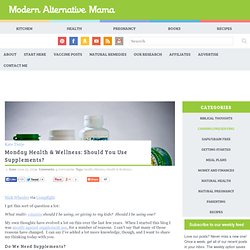

Health Topics. Our Health Topics section includes hundreds of articles on nutrition, diet, and health.

The menu at left groups related articles into convenient categories, or you can use the search engine to quickly zero in on a topic of interest. ABC's of Nutrition: Fat, protein, carbohydrates, vitamins, minerals, and more. Ask the Doctor: Holistic advice for treating various ailments Beginner Videos: Sarah Pope, Florida Chapter Leader, offers basic video tutorials on a number of subjects. Book Reviews: Thumbs Up reviews of books that give sound nutritional advice, and Thumbs Down reviews of those that give dangerous or ineffective advice Caustic Commentary: Sally Fallon and Mary G.
Children's Health: How to raise happy, healthy children Cod Liver Oil: Critical information on our number one superfood Dentistry: Articles on holistic dentistry DVD/Media Reviews: Thumbs Up and Thumbs Down reviews of DVD and other media from Tim Boyd and others. Broth is Beautiful. “Good broth will resurrect the dead,” says a South American proverb.

Said Escoffier: “Indeed, stock is everything in cooking. Without it, nothing can be done.” A cure-all in traditional households and the magic ingredient in classic gourmet cuisine, stock or broth made from bones of chicken, fish and beef builds strong bones, assuages sore throats, nurtures the sick, puts vigor in the step and sparkle in love life–so say grandmothers, midwives and healers.
For chefs, stock is the magic elixir for making soul-warming soups and matchless sauces. Meat and fish stocks play a role in all traditional cuisines—French, Italian, Chinese, Japanese, African, South American, Middle Eastern and Russian. Grandmother Knew Best Science validates what our grandmothers knew. Fish stock, according to traditional lore, helps boys grow up into strong men, makes childbirth easy and cures fatigue.
When broth is cooled, it congeals due to the presence of gelatin. Attention to Detail Cutting Corners Sidebars Recipes. What The Vitamin Industry Does Not Want You To Know « The Mommypotamus The Mommypotamus. My naturopath suggested I get my kids on a vitamin supplement…what do you use for your kids, or do you have a recommendation?

Thanks! ~ Kirsten Thanks for the question, Kirsten! Believe it or not, I actually don’t give my kids vitamins. Seems contrary to the “organic mama way,” doesn’t it? Reason #1: Multi-Vitamins Are Not The Insurance Policy We Think They Are Do you pick up your child’s dinner plate – sigh over the untouched veggies – and then think “oh well, at least he/she takes vitamins!”? [B]ecause children have a relative paucity [small amount] of the enzyme that converts B-carotene into vitamin A, children younger than five years generally do not do well with vegetables. In other words, we should be focused on getting our kids to eat BUTTER with a side of broccoli instead of the other way around! The bad news is those vitamins may give your kids nothing more than very expensive pee.
An absorption rate of only 9%? Hydrogenated oils and potential metal contamination? “But wait!” Should You Use Supplements? Nick Wheeler via Compfight I get this sort of question a lot: What multi- vitamin should I be using, or giving to my kids?

Should I be using one? My own thoughts have evolved a lot on this over the last few years. When I started this blog I was mostly against supplement use, for a number of reasons. Do We Need Supplements? In a perfect world: no. We don’t live in that world. Many of us live far away from our “natural habitat,” meaning that the food that’s easily available to us may not be optimal for us. Thus, at least for many of us, some supplementing is in order. What Supplements are Out There? Some people go overboard and take a handful — literally — of supplements everyday.
II.A.2. How the Body Works. II.A.3. Chart of Ingredients. II.A.4. Creating Your Diet. II.A.5. Food Preservation.